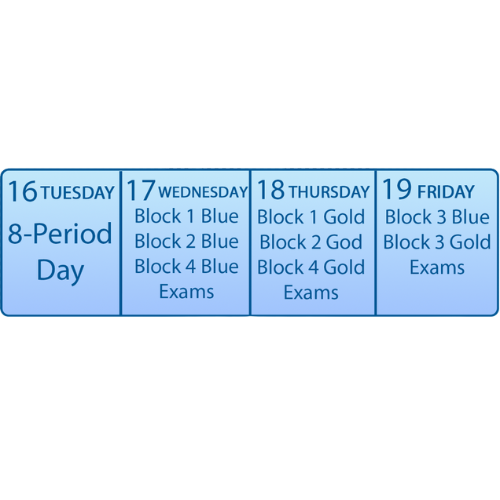The Schedule Choice Committee (SCC), consisting of 41 South teachers and administrators, is discussing the possibility of South switching from an eight-period day to a block schedule for the 2014-15 school year. The official decision is expected to be made by April 1, 2013.
This committee met with the Schedule Evaluation Committee (SEC) Nov. 6 to discuss what the SEC has found in its research comparing the two schedules.
According to Benedict Hussmann, history department representative for the committee, the SEC has visited North and Rolling Meadows, both schools with block schedules. The committee concluded that of all the different types of block schedules, if chosen, an AB schedule would be most appropriate for South. Hussmann said that with an AB schedule, students would attend four alternate day 90-minute classes.
According to Principal Dr. Brian Wegley, this preliminary meeting served to educate the SCC so that the members can later turn to their respective departments and inform them.
“Our goal [was] to really understand, and there’s been some really good work done by the [SEC] so then this group in February, on Feb. 4 and Feb. 5, they can present this to their departments and can get input from their departments,” Wegley said. “That will be our next step of this process.”
According to Hussmann, the discussion regarding the schedule change has been going on for a long time.
“Teachers are always talking about time issues,” Hussmann said. “What do I say at the end of every one of my classes? ‘We are ten minutes behind,’ and so there are a lot of frustrations that some teachers feel that we would do better in larger blocks of time.
According to Matthew Whipple, contract negotiator for the Teacher’s Association and head of the Glenbrook Academy, the district discussed changing to a block schedule 12 to 14 years ago. However, while North decided to change to blocks, South’s representatives decided that South should continue to have an eight-period schedule.
The implementation of block scheduling would take two years, according to Whipple, thereby not affecting current juniors and seniors.
“Let’s say we adopt a schedule by the end of this year, so 2013-14 would be the preparation year and 2014-15 would be where we would actually go into the schedule,” Whipple said.
Wegley said that this rigorous process is necessary to educate each department on block scheduling’s benefits and disadvantages. This way, the SCC can make the best decision for the school.
“I think there[…]are weaknesses and challenges[…]both [schedules] provide,” Wegley said. “It’s really a matter of us stepping back and getting a lot of input. I really want this to be something our teachers put a ton of input into.”
Math teacher William Lyon, who has taught summer school geometry for the past eight summers, said that he would prefer to have fewer, but longer, classes instead of shorter daily classes.
“I have seen the advantages to having a big chunk of time in which you can teach a course particularly for a subject like geometry which I think really lends itself to doing hands on activities, lab based activities, [which] would be hard to squeeze into a 50 minute period,” Lyon said. “I expect there are pros and cons [of block schedules][…]so I have some mixed feelings about it.
The extended periods would also benefit the Science Department, according to Jeffrey Rylander, Science Department representative for the council.
“The opportunity to do extended learning activities and build a diversity of activities into a given class— for science, it can allow for setting up the context for an investigation, time for students to design and carry out the investigation, and then time to report out their findings all within the same class period,” Rylander said.
According to Danita Fitch, World Language Department instructional supervisor, although she recognizes the controversy of not seeing students daily, which would especially be problematic when students are absent, she thinks blocks could allow students to learn at a deeper level. In her opinion as a teacher, getting deeper into the material is a key asset in learning language.
“[Seeing students daily] is important for language development, but as long as there is the consistency of every other day, I think it’s better to have a longer and deeper experience of the language [by] using it during that time than the 50 minutes,” Fitch said. “I think we spend so much time around here running from class to class. It’s stressful for students, and it’s stressful for teachers because you’re always switching gears.”
The advantages and disadvantages with a regular schedule and an AB block schedule were discussed amongst the SEC, according to Hussmann. A block schedule would have 450 minutes of class time rather than the 500 minutes of class time with an eight-period day.
Also, block schedule allows students to take eight classes in addition to lunch. Currently at South, students can take a maximum of seven classes if they have a lunch period, excluding early bird.
Senior Academy student Elizabeth Woo said that overall, she likes the mixture of North’s AB block schedule and South’s schedule.
“I think my schedule is a really good mix of both schedules because the Academy classes essentially work as a block schedule— 70 minutes of two interchanging classes out of three,” Woo said. “Then the rest of my day works as a South schedule.”
Hussmann said that when North and South discussed changing to a block schedule before, he was against the idea.
“I opposed the movement before, but I’m leaning strongly in favor of block scheduling now,” Hussmann said.
The SCC will discuss block schedules with staff on Feb. 4 and 5, 2013.







